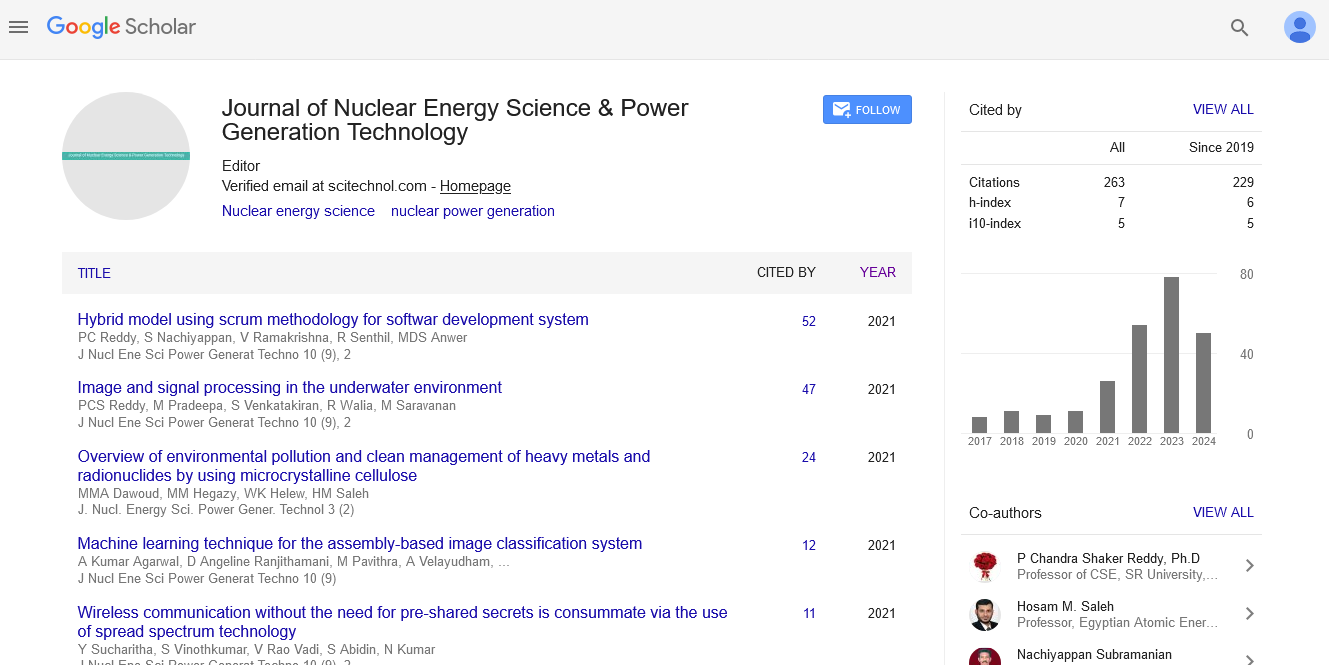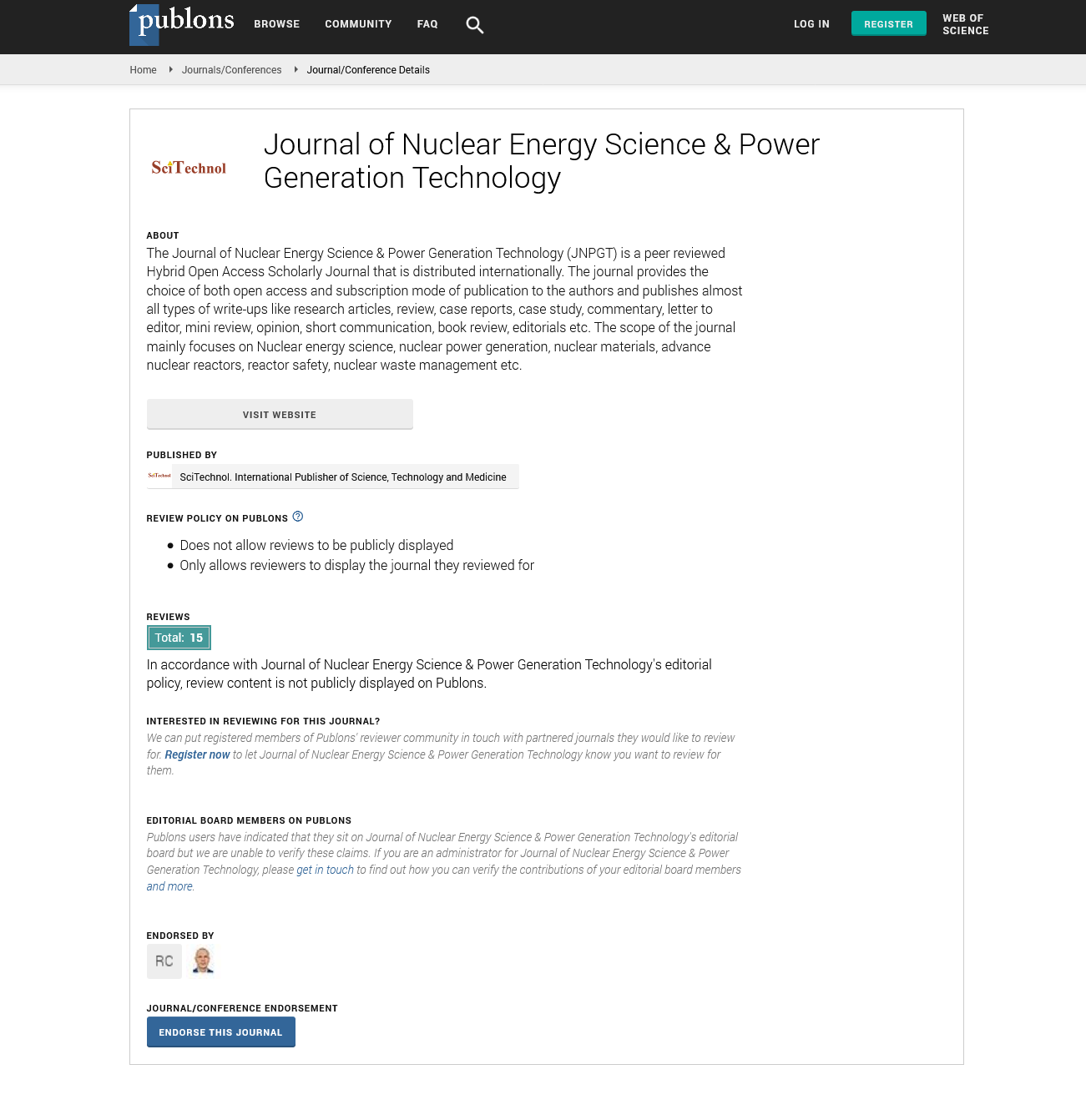Perspective, J Nucl Ene Sci Power Generat Technol Vol: 12 Issue: 3
Vital Function of Nuclear Energy in Carbon Neutrality
Eman Elged*
1Nuclear Engineering and Radiological Sciences, University of Michigan, Michigan, USA
*Corresponding Author: Eman Elged,
Nuclear Engineering and Radiological
Sciences, University of Michigan, Michigan, USA
E-mail: emanelged@gmail.com
Received date: 24 April, 2023, Manuscript No. JNPGT-23-102509;
Editor assigned date: 28 April, 2023, PreQC No. JNPGT-23-102509 (PQ);
Reviewed date: 15 May, 2023, QC No. JNPGT-23-102509;
Revised date: 23 May, 2023, Manuscript No. JNPGT-23-102509 (R);
Published date: 31 May, 2023, DOI: 10.4172/2325-9809.1000339.
Citation: Elged E (2023) Vital Function of Nuclear Energy in Carbon Neutrality. J Nucl Ene Sci Power Generat Technol 12:3.
Keywords: climate change
Description
In the face of climate change and the urgent need to transition to a low-carbon future, nuclear energy emerges as a key player in achieving global carbon neutrality goals. As governments and organizations around the world grapple with reducing greenhouse gas emissions, nuclear power offers a viable and scalable solution. With its proven track record of reliable electricity generation, minimal greenhouse gas emissions, and advanced safety features, nuclear energy can play a vital role in decarbonizing our energy systems. Nuclear energy holds a distinct advantage over fossil fuels in terms of carbon emissions. Unlike coal, oil, and natural gas, which emit significant amounts of carbon dioxide during combustion, nuclear power plants produce electricity through a process called nuclear fission. This process releases a tremendous amount of energy by splitting atoms, but it does not emit carbon dioxide or other greenhouse gases into the atmosphere. As a result, nuclear power provides a near-zero carbon emissions alternative to fossil fuel-based electricity generation.
Furthermore, nuclear energy is a highly efficient and reliable source of power. Nuclear power plants operate at high capacity factors, typically exceeding 90%, meaning they generate electricity at a consistent rate throughout the year. This reliability is difficult for maintaining a stable grid and meeting the demands of a carbon-neutral energy system that relies heavily on intermittent renewable sources, such as wind and solar.
While safety concerns have been raised regarding nuclear energy, significant advancements have been made in reactor design and safety protocols to mitigate risks. Modern nuclear power plants incorporate multiple layers of safety systems and passive cooling mechanisms, ensuring their resilience even in extreme scenarios. These advanced designs, such as Generation III+ and Generation IV reactors, prioritize safety, minimizing the potential for accidents and reducing the impact of any unforeseen events.
Moreover, the effective management and storage of nuclear waste have been addressed through advanced technologies, including reprocessing and deep geological repositories. These innovations contribute to the overall sustainability and long-term viability of nuclear energy, assuring that waste is properly handled and stored. One of the key advantages of nuclear energy is its scalability. Nuclear power plants can be constructed to meet the needs of small communities or scaled up to provide electricity for large cities. This versatility allows nuclear energy to play a significant role in the transition to a carbon-neutral future. Additionally, nuclear power can provide baseload electricity, operating around the clock, complementing the intermittent nature of renewable energy sources.
Conclusion
As countries strive to achieve carbon neutrality, nuclear energy emerges as a vital component of the energy mix. With its low-carbon footprint, high reliability, and advanced safety features, nuclear power provides a sustainable solution to meet the growing energy demands without contributing to climate change. Moreover, the scalability and versatility of nuclear energy make it a suitable complement to intermittent renewable sources. However, careful planning, stringent regulations, and ongoing research and development are essential to maximize the potential of nuclear energy while addressing concerns related to safety, waste management, and public perception by embracing nuclear power, can accelerate the global transition to a sustainable, low-carbon future.
 Spanish
Spanish  Chinese
Chinese  Russian
Russian  German
German  French
French  Japanese
Japanese  Portuguese
Portuguese  Hindi
Hindi 

